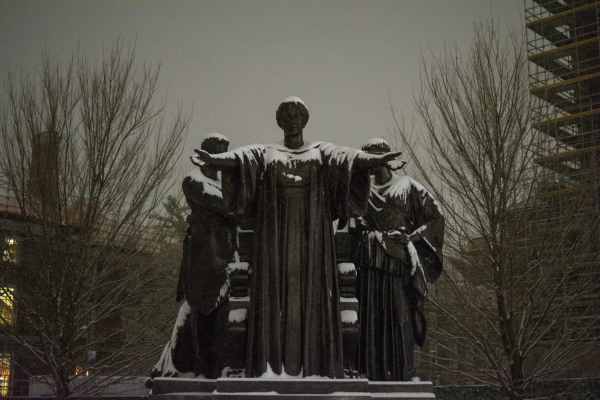Column: On the quest for fulfillment
Mar 28, 2006
A cursory look at the past will reveal that religion and spirituality have been an important aspect of every culture. The religions themselves have, of course, been widely varied, as have the societies. Their differences are not what is important at the moment. Instead, what is important is that every religion, as ridiculous as some of them may seem to be, have sought to fulfill the spiritual needs of its adherents. “What is the meaning of life?” is a phrase that is often heard asked by great philosophers. Religions provide an answer – or if they do not provide an answer, they provide a process through which an answer may eventually be obtained.
But, notice that I said “the past.” Many people would probably agree that supernaturalism and mysticism rightly belong there. What many people have sought to do is replace religion with irreligion. Gone are the religious institutions that dominated the past, the institutions that sought to bring order to people’s lives. History has been rewritten to damn those very institutions that had as their primary goal the betterment of humanity. Society, some will say, has matured.
For many, religion has disappeared – this cannot be denied. However, religion has existed as an external device to quell the internal desire for fulfillment that every human person has. This internal desire has not vanished, but it certainly has sought out alternate means of fulfillment in light of the void left by the disappearance of religion.
Some people acknowledge this fact: “I’m spiritual but not religious.” Others reject both. The results have been new-age quests for inner peace and a relatively recent religious phenomenon: materialism.
Materialism could also be called hedonism. In materialism, the mere idea that there are spiritual needs is rejected. One is concerned only with the needs of the flesh. “Carpe diem” is the rallying cry of this religion. Pleasure is to be cherished above all else.
Get The Daily Illini in your inbox!
The fact that this new religion has emerged should not be surprising. Allow me to make a statement that some might disagree with: “One nation, under God” applies as much to this secular nation as it does to a theocracy. Why? Because materialists, in the vain of some of the reformers almost 500 years ago, have deified themselves. In every religion that worships the God of Abraham, God is the ultimate source of truth, the alpha and the omega. In materialism, the individual is now the ultimate source of truth. It is easy to see from whence moral relativism emerges.
This deification of the self has resulted in various problems society now faces. Sex is no longer seen as something that will ensure the survival of our species or as the single most unitive act humans can engage in with one another. Sex used to be an expression of pure love, but now it is simply an end – it brings pleasure.
Love has been replaced with infatuation. Unconditional, self-giving love has been replaced with self-serving lust. The extreme manifestation of this is that people are willing to break up with their partner because they do not “put out,” as if the other person was not human at all, but a machine whose only purpose was to provide pleasure.
Participation in the community at religious ceremonies has been replaced with participation in the community at bars. The weekly trek to the bars has almost become a spiritual obligation, a place for people to forget their problems by stripping away the one thing the materialists hold dear – their rationality.
The materialists, while they may describe themselves as irreligious, have seemingly created a new religion for themselves. They seek, like all other human beings, to satiate their spiritual needs and curiosity, while simultaneously denying that such needs exist. True spiritual fulfillment does exist, but it cannot be attained by serving the flesh and neglecting the spirit. The sooner materialists realize this, the better off they will be.
John Ostrowski is junior in Communications. Nietzsche is as dead as he is wrong. His column appears Tuesdays. He can be reached at [email protected].





